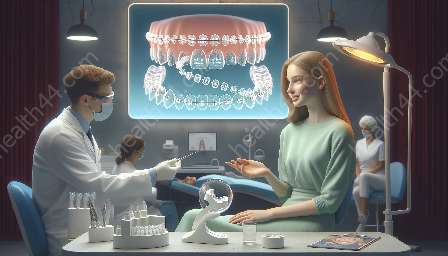Invisalign treatment has become increasingly popular due to its discreet and convenient nature, but what are its long-term effects on oral health? This topic cluster aims to delve into the benefits, considerations, and compatibility of Invisalign with other orthodontic appliances.
The Benefits of Invisalign on Oral Health
Invisalign offers numerous benefits to oral health, especially in the long term. Here are some key advantages:
- Straightening and Aligning Teeth: Invisalign effectively straightens and aligns teeth, improving overall oral health and reducing the risk of tooth decay and gum disease.
- Improved Bite: Proper alignment of teeth can contribute to a more balanced bite, reducing the risk of temporomandibular joint (TMJ) disorders.
- Oral Hygiene Maintenance: Invisalign aligners are removable, allowing for easier maintenance of oral hygiene compared to traditional braces.
- Reduced Risk of Dental Issues: By addressing misalignments, Invisalign can help prevent dental issues that may arise from crooked teeth, such as cavities and gum inflammation.
- Enhanced Confidence: The improved appearance of aligned teeth can have a positive impact on an individual's self-esteem and confidence.
Considerations and Precautions
Despite its many benefits, it's essential to consider some potential long-term effects and take necessary precautions when undergoing Invisalign treatment:
- Compliance with Usage: Invisalign aligners must be worn for 20-22 hours per day for optimal results, and non-compliance can affect the treatment outcome and potentially lead to additional oral health issues.
- Orthodontic Maintenance: In some cases, additional orthodontic appliances may be required alongside Invisalign treatment, and compatibility with these appliances should be carefully assessed.
- Post-Treatment Retention: After the completion of Invisalign treatment, patients may need to use retainers to maintain the achieved results, ensuring the long-term stability of their oral health and alignment.
Compatibility with Orthodontic Appliances
For individuals who require multiple orthodontic appliances or have more complex orthodontic needs, it's vital to understand the compatibility of Invisalign with other treatments:
- Traditional Braces and Invisalign: In some cases, a combination of traditional braces and Invisalign may be recommended to address specific orthodontic issues, and this approach can potentially enhance the long-term effectiveness of the treatment.
- Surgical Orthodontics: Individuals in need of surgical orthodontic procedures may also benefit from Invisalign as part of their overall treatment plan, contributing to the long-term improvement of their oral health and facial aesthetics.
- Interdisciplinary Approach: Orthodontic treatment often involves collaboration with other dental specialists, and the compatibility of Invisalign with various interdisciplinary treatments should be considered for comprehensive long-term results.
The Importance of Long-Term Oral Health Monitoring
After completing Invisalign treatment, ongoing monitoring of oral health is essential to ensure the maintenance of results and early detection of any potential issues. Regular dental check-ups and compliance with post-treatment instructions are crucial for preserving the long-term benefits of Invisalign.
Conclusion
Invisalign treatment offers a range of long-term benefits for oral health, including improved alignment, reduced dental issues, and enhanced oral hygiene. Understanding its compatibility with other orthodontic appliances and the importance of continued monitoring can contribute to the sustained success of this innovative treatment option.


